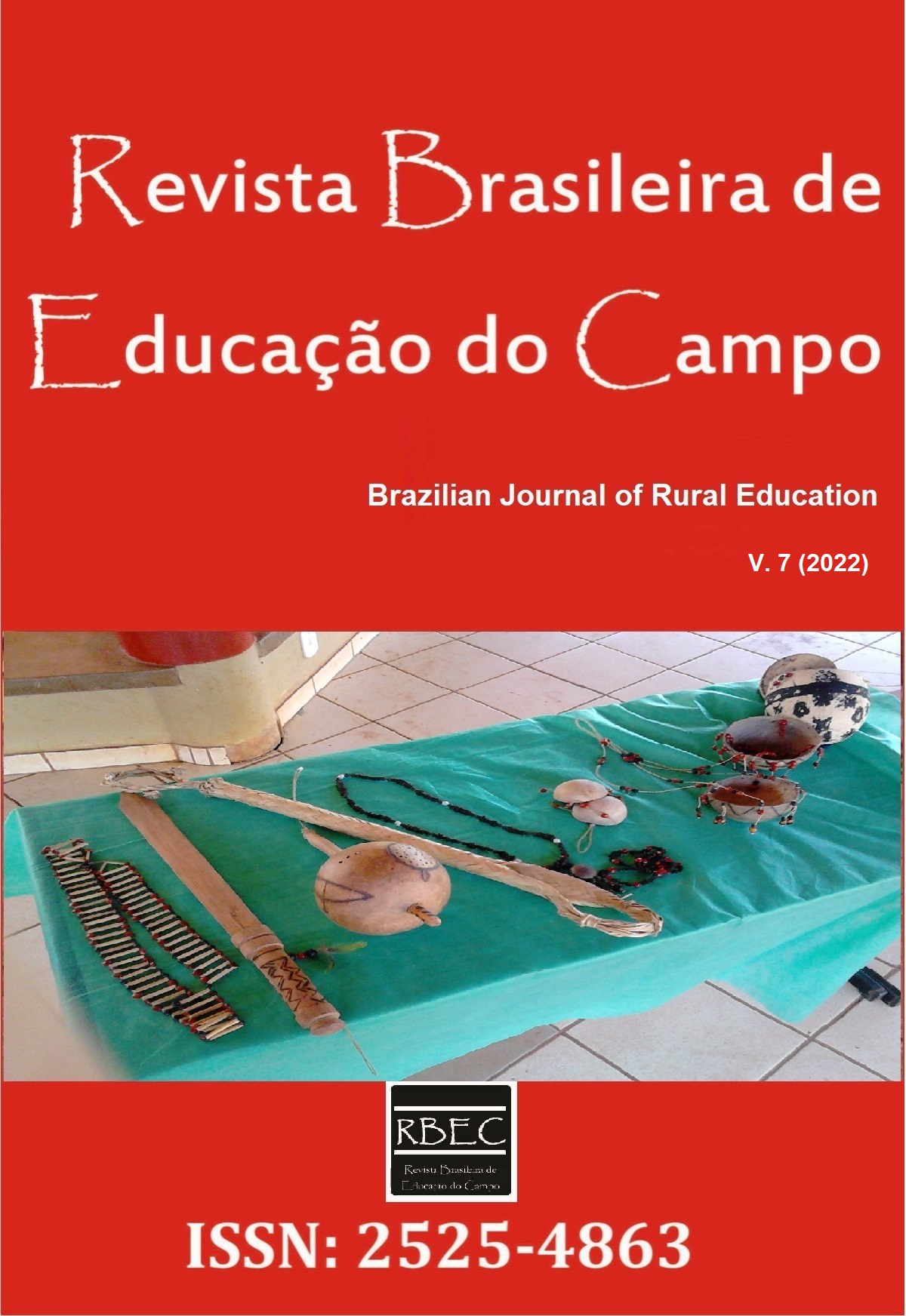The Program Escola da Terra in the continuing education of teachers from rural and quilombola schools: sociocultural practices as generating themes in the teaching of school mathematics
DOI:
https://doi.org/10.20873/uft.rbec.e13897Abstract
ABSTRACT. The Escola da Terra Program is a State policy, involving the federal government, state and municipal governments, as well as social movements and Public Higher Education Institutions. It seeks to promote specific continuous formation of teachers to meet the needs of rural and quilombola schools. This article aims to report and analyze contributions of the Improvement Course Escola da Terra at UFT, Arraias Campus, in the formation of rural teachers in Tocantins, having as reference the Module: Mathematical Languages. We analyzed materials produced by course participants, contents and methodologies addressed in the formation. The investigation uses as a research instrument the field reports of the professionals involved in the project. The data were analyzed in the light of the theoretical framework that deals with rural education, ethnomathematics, sociocultural practices and initial and continuing teacher formation. We highlight the elaboration of the action projects of the course participants, the result of reflections on the contents discussed during online meetings and materialized in the community time in the schools where they work. Although there are many challenges, we recognize that the Project (UFT) and the Program (MEC) Escola da Terra have triggered formation processes, which seek to build spaces for dialogue and reflection on educational practices based on their contexts, in line with the principles of Rural Education.
Downloads
References
Brasil, Portaria nº 579, de 2 de julho de 2013 Institui a Escola da Terra. Recuperado de: https://www.in.gov.br/materia/-/asset_publisher/Kujrw0TZC2Mb/content/id/30695064. Acesso em: 15 01 2022.
Carvalho, R. A. (2016). Identidade e cultura dos povos do campo no Brasil: entre preconceitos e resistências, qual o papel da educação. Curitiba: Appris.
Delizoicov, D., Angotti, J. A., & Pernambuco, M. M. (2011). Ensino de Ciências: fundamentos e métodos. 4. ed. São Paulo: Cortez.
Freire, P. (2014). Educação e mudança. 36. ed. rev. e atual. São Paulo: Paz e Terra.
Freire, P. (2014). Pedagogia do oprimido. 57. ed. rev. e atual. Rio de Janeiro: Paz e Terra.
Hage, S. A. M., & Pena, S. C. (2018). Programa Escola da Terra, das Águas e da Floresta: experiência de formação de educadores contextualizada e afirmativa da diversidade sociocultural e territorial da Amazônia paraense. In Hage, S. A. M. et al. (Orgs.). Programa Escola da Terra: cartografia da diversidade e complexidade de sua execução no Brasil (pp. 121-134). Curitiba: Editora CRV.
Khidir, K. S., & Coelho, R. R. (2019). Práticas socioculturais na formação continuada de professores que ensinam matemática em escolas campesinas do Triângulo Mineiro. In Costa, A. C. M. (Org.) Diálogos com a Educação do campo: as experiências do Programa Escola da Terra (pp. 148-172). Universidade Federal de Uberlândia. Uberlândia: PROEX/UFU.
MEC (2013). Programa Nacional de Educação do Campo – PRONACAMPO. Documento Orientador, Brasília.
Mendes, I. A. (2009). Matemática e investigação em sala de aula: tecendo redes cognitivas de aprendizagem. São Paulo: Editora Livraria da Física.
Mendes, I. A., & Farias, C. A. (Orgs.). (2014). Práticas Socioculturais e Educação Matemática. São Paulo: Editora Livraria da Física.
Nascimento, C. G. (2006). Educação e cultura: as Escolas do Campo em movimento. Revista Fragmentos de Cultura-Revista Interdisciplinar de Ciências Humanas, 16(1112), 867-883. Recuperado de: http://seer.pucgoias.edu.br/index.php/fragmentos/article/view/184/147
Pernambuco, M. M. A. C. (1994). Educação e escola como movimento (Tese de Doutorado). Universidade de São Paulo, São Paulo.
Published
How to Cite
Issue
Section
License
Proposal for Copyright Notice Creative Commons
1. Policy Proposal to Open Access Journals
Authors who publish with this journal agree to the following terms:
A. Authors retain copyright and grant the journal right of first publication with the work simultaneously licensed under the Creative Commons Attribution License that allows sharing the work with recognition of its initial publication in this journal.
B. Authors are able to take on additional contracts separately, non-exclusive distribution of the version of the paper published in this journal (ex .: publish in institutional repository or as a book), with an acknowledgment of its initial publication in this journal.
C. Authors are permitted and encouraged to post their work online (eg .: in institutional repositories or on their website) at any point before or during the editorial process, as it can lead to productive exchanges, as well as increase the impact and the citation of published work (See the Effect of Open Access).















